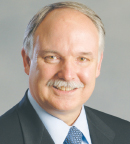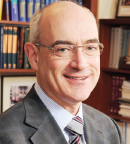
Patrick J. Loehrer, MD, FASCO

Everett E. Vokes, MD, FASCO
Patrick J. Loehrer, MD, FASCO, of the Indiana University Melvin and Bren Simon Cancer Center, and Everett E. Vokes, MD, FASCO, of the University of Chicago Medicine Comprehensive Cancer Center, were selected by the ASCO Nominating Committee as candidates for President-Elect. Below, they discuss their qualifications for the role, as well as issues within the field of oncology they feel they could have an impact on as ASCO President.
What specific skills and attributes do you bring to this position that make you a strong candidate for ASCO President?
Dr. Loehrer: I have been, and remain, a clinician and a clinical researcher. My work began with early-phase trials evaluating ifosfamide in refractory germ cell (and other) tumors that ultimately led to its U.S. Food and Drug Administration (FDA) approval. Numerous other clinical trials, which I led, have resulted in National Comprehensive Cancer Network® guideline recommendations in genitourinary, gastrointestinal, and thymic malignancies. Leadership roles in local, national, and international organizations over the course of my career support my unique qualifications for this position, including currently serving as Director of the Indiana University Melvin and Bren Simon Cancer Center. As announced on August 6, 2019, by acting National Cancer Institute Director Douglas Lowy, MD, our center became the first Midwestern National Cancer Institute–designated Cancer Center to receive comprehensive designation in over a decade.
Shortly out of fellowship, I established the Hoosier Oncology Group (now known as the Hoosier Cancer Research Network) and served as its group chair for 2 decades. I also founded the Academic Model Providing Access to Healthcare (AMPATH)-Oncology Program. AMPATH is a partnership of multiple North American institutions with Moi University in Kenya and Moi Teaching and Referral Hospital, which treats 10,000 patients with cancer annually and screens over 1,000 women monthly for cervical and breast cancers. More recently, I co-founded the Big Ten Cancer Research Consortium and currently serve as Chair of the Cancer Directors Committee.
Within ASCO, I have enjoyed serving as Chair or Vice Chair on numerous committees, including Career Development, Audit and Finance, Bylaws, Professional Development, and Scientific Program. I was also one of the inaugural Co-Chairs of the Leadership Development Program. Most recently, I served on the Strategic Planning Task Force. In recognition of contributions to ASCO, I am honored to have received the designation of Fellow of the American Society of Clinical Oncology (FASCO), the Special Recognition Award, and, in 2017, the inaugural Allen S. Lichter Visionary Leadership Award.
Collectively, these experiences provide evidence to my capacity for leadership of this impactful international society.
Dr. Vokes: Within ASCO, I have held numerous roles, including Chair of the Annual Meeting Education Committee. I have also been on the Annual Meeting Scientific Program Committee several times, including serving as Chair. In addition, I was elected to the Nominating Committee and served on ASCO’s Board of Directors. I was also a recipient of the ASCO Translational Research Professorship, which was instrumental in supporting the training of young investigators.
I have held leadership positions at the University of Chicago since the early 1990s, including roles in the cancer center and other academic units. Specifically, over the past 2 decades, I have held three significant leadership positions: Chair, Department of Medicine (2009–present); Interim Dean of the Biological Sciences Division and Pritzker School of Medicine and Chief Executive Officer of the University of Chicago Medical Center (2009–2010); and Chief, Section of Hematology/Oncology (1998–2009).
In addition, I have a long history of leading clinical and translational research in the areas of head and neck cancer, lung cancer, and early-phase clinical trials and have received federal and nonfederal funding throughout most of my career. My scientific focus has been on early-phase translational and clinical trials, the interaction of chemotherapy and radiation, and curative-intent combined modality
therapies. I have been a leader of integrated research teams for these malignancies at our institution and on a national level. I was principal investigator of our phase II National Cancer Institute–sponsored contract from 1994–2009 involving physicians from academic and private practice. I have maintained an active clinical practice for more than 30 years; am requested as a care provider by patients from many states and regions; and have been named regularly in various “Best Doctors” lists.
Externally, I serve or have served on several editorial boards, including those of the Journal of Clinical Oncology, Journal of the American Medical Association, TheLancet Oncology, Clinical Lung Cancer, Investigational New Drugs, and Annals of Oncology. My work has been influential in national settings within the Alliance (formerly Cancer and Leukemia Group B), where I chaired the Respiratory Committee from 2004–2017.
Discuss two or three key issues that ASCO and the oncology field are currently facing and how you wish to make an impact on these issues as ASCO President.
Dr. Loehrer: The areas of major importance to our Society involve both our members and those we serve through our profession. They align closely with the Strategic Plan and include:
Physician burnout and professional development: Oncology is one of the most rewarding but most complex fields of medicine. The doubling time of all medical knowledge in 1950 was 50 years; in 1980, it was 7 years; and today it is estimated to be 0.2 years, or just 73 days.1 This is even more apparent in our field, where new molecular markers and pathways are discovered daily, and a new agent with an oncology indication is approved by the FDA weekly. Coupled with the increasing time demands of electronic medical records, this firehose of information is both exciting as well as daunting, for it can leave the practicing physician with an increasing fear of early obsolescence. ASCO must play a major role through novel and aggressive educational programs that synthesize and prioritize this explosion of knowledge into health-care practices and promulgate the development of tools to diminish the time demands on our profession.
Health-care disparities and quality care: Disparities in cancer care have many faces. This includes improved access to care and clinical trials through comprehensive insurance reform, where ASCO has proudly been at the forefront on behalf of our patients. Fiscal toxicity, including medical coverage, has a real impact on quantity and quality of life. To emphasize this issue, I would like to see efforts that include costs on discussion in all prospective randomized trials presented at ASCO meetings. ASCO has the capacity to provide key data through CancerLinQ to enhance quality care and provide evidence-based information that can help shape health policy. This includes improved partnerships with primary care physicians, nurses, gerontologists, and hospital systems in order to have a meaningful and sustainable impact across all noncommunicable chronic diseases.
Fighting the “War on Cancer” on the front lines: In low- to middle-income countries, the burden of cancer has risen disproportionately compared to high-income countries (70% of new cases worldwide). ASCO has begun to address these issues through education and research initiatives, but we can do more as an organization. ASCO has the gravitas and influence to partner with the NCI, other international governmental agencies, and industry to develop a comprehensive strategic approach to optimize prevention, treatment, palliation, and access to quality care across the globe, including the underserved areas of the United States and other high-income countries.
Dr. Vokes: ASCO and its members are faced with increasing impediments to effectively function as health-care providers and investigators in an environment of overregulation, relative underfunding, and increasing drug prices and/or shortages. Another challenge is retaining the next generation of national and international trainees and investigators in our Society.
First, ASCO needs to continue its engagement to shape future structures supporting cancer research and clinical trials. What is the role of government-supported translational and clinical research vs pharmaceutical-supported trials with more narrow goals? This is an important question with both national and global implications. ASCO has been committed to supporting research and scientific innovation—as exemplified by the Targeted Agent and Profiling Utilization Registry (TAPUR) Study and innovative health-care solutions such as CancerLinQ integrated with a rapid learning system—and is well positioned to further contribute to solutions to these questions.
Second, the support of young investigators through ASCO’s various grant mechanisms has been highly successful. We can do more to encourage young scientists to commit to careers in science as they struggle with low pay lines and competition from industry for their talent. ASCO needs to work with government officials to revitalize public funding for clinical trials. These issues will benefit from continued analysis and discussion.
Third, working with government officials to find solutions to complex reimbursement problems remains an ongoing high priority. Reimbursement is shrinking, and we will need to find just ways to compensate oncologists and their teams to provide care for very complex patients and maintain oncology as the attractive, innovative specialty it is.
Moving forward, ASCO’s leadership will have to rely less on annual themes and year-to-year operations and continue to better define and communicate its intermediate- and long-term goals. Better integration of the international community will be of special significance if ASCO wants to maintain its leading worldwide position, contribute to global oncology, and maintain its membership and wide reach of the Annual Meeting. ■
© 2019. American Society of Clinical Oncology. All rights reserved.
Reference
1. Densen P: Challenges and opportunities facing medical education. Trans Am Clin Climatol Assoc 122:48-58, 2011.

